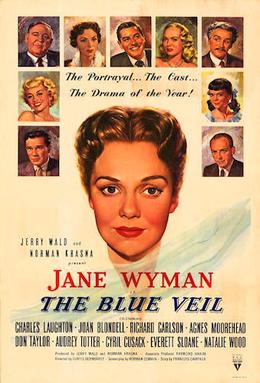
The Blue Veil is a 1951 American historical drama film directed by Curtis Bernhardt and starring Jane Wyman, Charles Laughton and Joan Blondell. It tells the story of a woman who spends her life caring for other people’s children, beginning just after World War I. The title refers to the headdresses once worn by governesses and nannies, colored blue to distinguish them from the white veils worn by medical nurses. The screenplay by Norman Corwin is based on a story by François Campaux, adapted for the French-language film Le Voile Bleu in 1942.
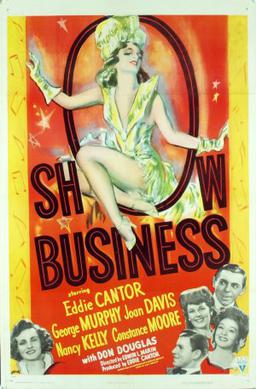
Show Business is a 1944 movie musical film starring Eddie Cantor, George Murphy, Joan Davis, Nancy Kelly, and Constance Moore. The film was directed by Edwin L. Marin and released by RKO Radio Pictures.

Franciska Gaal was a Hungarian cabaret artist and film actress of Jewish heritage. Gaal starred in a popular series of European romantic comedies during the 1930s. After attracting interest in Hollywood she moved there and made three films.
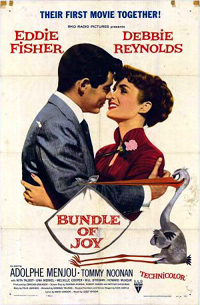
Bundle of Joy is a 1956 American Technicolor musical film directed by Norman Taurog and starring Eddie Fisher, Debbie Reynolds and Adolphe Menjou. It is a remake of the 1939 comedy film Bachelor Mother, which starred Ginger Rogers and David Niven, and was itself an English remake of the 1935 Austrian-Hungarian comedy film Little Mother.

Otto Wallburg was a German actor and Kabarett performer. He was a prolific film actor during the late silent and early sound era. He was arrested by the Nazis when they occupied the Netherlands and was killed in Auschwitz in October 1944.
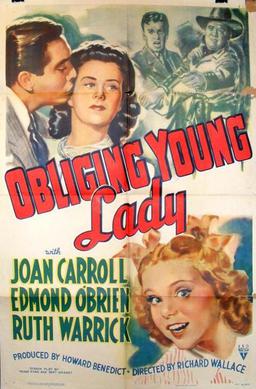
Obliging Young Lady is a 1942 American romantic comedy film directed by Richard Wallace and starring Joan Carroll, Edmond O'Brien, Ruth Warrick.
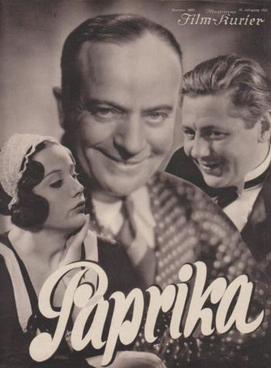
Paprika is a 1932 German comedy film directed by Carl Boese and starring Franciska Gaal, Paul Hörbiger and Paul Heidemann. Made by the German branch of Universal Pictures, it was based on a hit play by Max Reimann and Otto Schwartz. A French-language version and an Italian-language version were released the following year. It is also known by the alternative title of Marriage in Haste. In the US, the film was released almost 2 years later in German on 18 May 1934 in the Yorkville theater under the title Wie man Maenner fesselt (How to charm men).

RKO Radio Pictures Inc., commonly known as RKO Pictures or simply RKO, was an American film production and distribution company, one of the "Big Five" film studios of Hollywood's Golden Age. The business was formed after the Keith-Albee-Orpheum theater chain and Joseph P. Kennedy's Film Booking Offices of America studio were brought together under the control of the Radio Corporation of America (RCA) in October 1928. RCA executive David Sarnoff engineered the merger to create a market for the company's sound-on-film technology, RCA Photophone, and in early 1929 production began under the RKO name. Two years later, another Kennedy concern, the Pathé studio, was folded into the operation. By the mid-1940s, RKO was controlled by investor Floyd Odlum.
The Girl and the Gambler is a 1939 Western film, from RKO Radio Pictures, starring Tim Holt. It was an early starring Western for Holt, who soon replaced George O'Brien as the studio's main Western star.

Road Agent is a 1952 American western film directed by Lesley Selander and starring Tim Holt, Richard Martin and Noreen Nash. It was produced and distributed by RKO Pictures as part of a long-running series featuring Holt and Martin. Principal supporting cast members included Dorothy Patrick and Mauritz Hugo.
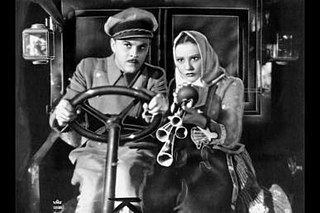
Catherine the Last is a 1936 Austrian romantic comedy film directed by Henry Koster and starring Franciska Gaal, Hans Holt and Hans Olden. It was made by the Austrian subsidiary of Universal Pictures. The film's sets were designed by the art director Erwin Scharf. After making the film, Koster moved to Hollywood] In 1938, the film was remade in America as The Girl Downstairs with Gaal reprising her role.

The Girl Downstairs is a 1938 American romantic-comedy film directed by Norman Taurog and starring Franciska Gaal, Franchot Tone and Walter Connolly. It is a remake of the 1936 Austrian film Catherine the Last, directed by Henry Koster, which had been a major hit for Gaal.

It Happened to One Man is a 1940 British drama film directed by Paul L. Stein and starring Wilfrid Lawson, Nora Swinburne and Marta Labarr. The screenplay was scripted by Paul Merzbach and Nina Jarcis, based on the play of the same name by John Hastings Turner and Roland Pertwee. Produced by Victor Hanbury's British Eagle Productions,

Scandal in Budapest is a 1933 German-Hungarian comedy film, filmed in Hungary in the German language and directed by Géza von Bolváry and Istvan Szekely and starring Franciska Gaal, Werner Pledath, and Lotte Spira. It was made at Budapest's Hunnia Studios by the European subsidiary of Universal Pictures, headed by Joe Pasternak, which had recently left Germany in the face of Hitler's "de-Judification" of that country. A separate Hungarian-language version was also made, with a different cast, titled Pesti Szerelem. Both versions were released in the United States by Arthur Mayer's DuWorld Pictures Inc.
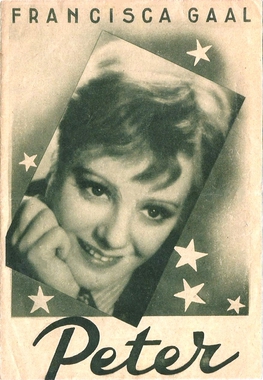
Peter is a 1934 Austrian-Hungarian comedy film directed by Henry Koster and starring Franciska Gaal, Felix Bressart and Richard Eybner.
Renee XIV was an unfinished 1946 Hungarian film directed by Ákos Ráthonyi and starring Franciska Gaal, Johannes Heesters and Theo Lingen. It was intended to be a German-language film made with Soviet-backing at the Hunnia Film Studio in Budapest, starring Gaal, a popular pre-war star who had not made a movie in several years. After around 10 days of filming, the production was abandoned. Gaal emigrated to America the following year, and she never made another film.
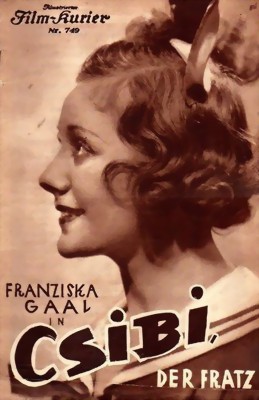
A Precocious Girl is a 1934 Austrian comedy film directed by Max Neufeld and Richard Eichberg and starring Franciska Gaal, Leopoldine Konstantin and Herbert Hübner. The film's sets were designed by art director Julius von Borsody.
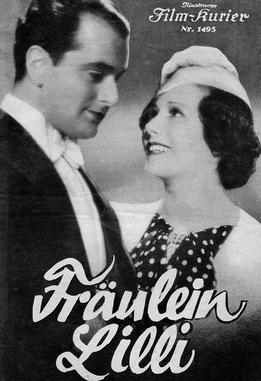
Fräulein Lilli or Miss Lilli is a 1936 Austrian comedy film directed by Hans Behrendt, Robert Wohlmuth and Max Neufeld. It starred Franciska Gaal, Hans Jaray and S.Z. Sakall. It was Gaal's last European film, although she did briefly start work in 1946 on Renee XIV, before it was abandoned during filming.

Spring Parade is a 1934 comedy film directed by Géza von Bolváry and starring Paul Hörbiger, Franciska Gaal, and Wolf Albach-Retty.
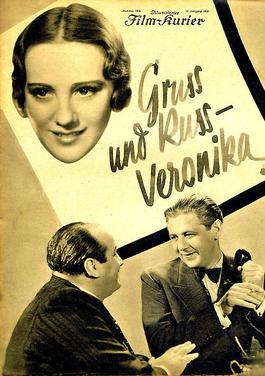
Greetings and Kisses, Veronika is a 1933 German comedy film directed by Carl Boese and starring Franciska Gaal, Paul Hörbiger, and Otto Wallburg. It was shot at the Johannisthal Studios in Berlin. The film's art direction was by Kurt Dürnhöfer and Max Heilbronner. The film's popularity made Gaal an international star. However the rise of the Nazi Party to power meant that the Jewish Gaal had to make her next films in Hungary and Austria.


















